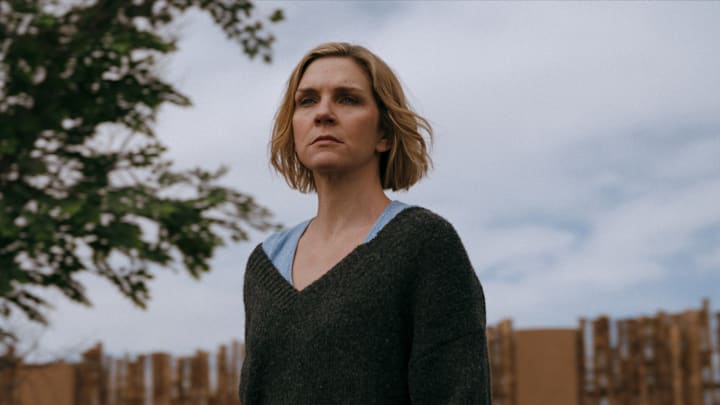Pluribus has somehow found a way to make the apocalypse look oddly appealing, while simultaneously presenting world peace as something to be feared. Showrunner Vince Gilligan has always been great at skewing what would often be a black-or-white perception, and his ability to do so against a sci-fi backdrop only further cements his status as one of the biggest legends of the TV industry.
The Apple TV+ project is something of an outlier when it comes to its rivals within the genre. The trailers and other promotional material for high-concept sci-fi shows are rarely afraid to share their entire premise and provide a healthy glimpse of the world in which the story is set. Pluribus refused to do that, offering up little more than mere morsels of context until the double-episode premiere landed.
As a result, viewers went into Pluribus with almost no idea what they were in for. Personally, I love this approach, and I wish more shows followed a similar promotional framework. The potential downside is that those who don't routinely engage with sci-fi might struggle to keep up with Pluribus' storyline and its in-depth worldbuilding at the same time. Thankfully, I'm here to help you out and explain what happened to humanity within the show's universe.
FULL SPOILERS for Pluribus episodes 1 and 2 below.

The 'virus' that brought about world peace in Pluribus has a largely unconfirmed origin
Pluribus' opening scene show's mankind's discovery of a strange signal being picked up from somewhere in deep space. The oddly comical sequence shows Earth's greatest scientific minds gathering to try and decipher what they believe to be a message. The transmission is ultimately discovered not to be a message, but a detailed formula for something most accurately described as a virus.
However, even Pluribus admits that "virus" isn't quite the right term, and describes the phenomenon as more of a "psychic glue." Regardless, Earth's brightest figures in their respective industries manage to follow the complex instructions from outer space — if they were ever instructions in the first place — and recreate the psychic glue on the human homeworld. After experimenting on animals in a lab, the not-quite-virus jumps to its first human via a rat bite, and the spread gradually increases in speed until almost everyone is infected.

How Pluribus' psychic glue spreads from host to host and what it does
Pluribus' first two episodes show two main ways the psychic glue takes hold of a human being. The first is when the infected rat bites a scientist responsible for working on the formula, and the other is when an infected human kisses another on the mouth. So, it's reasonable to assume that the infection can spread via saliva, but the show's pilot suggests there are other ways, when most of Earth's population is brought into the fold somehow in one fell swoop.
Once an individual has been exposed, they're welcomed into a planet-wide hive mind. Everyone's memories, experiences, and personalities, are pooled into one collection consciousness with a link that's constantly active. In short, if you're speaking to one infected human, you're speaking to all of them. Those who speak about what they experience as part of his hive mind only ever talk about how blissful their existence now is. There's no war, no fighting over resources, no conflict of any kind among those who've been infected. They won't kill animals either, for seemingly any reason.
For all of its utopian appearances, there is a very small minority mysteriously immune to the extraterrestrial infection. Most of those outliers are either on board with eventually being welcomed into the "joining" when it becomes a possibility down the line, but Rhea Seehorn's Carol Sturka is adamant that surrendering her status as an individual is essentially endorsing what she percieves to be an under-the-radar apocalypse.

Earth's new hive mind isn't an impervious path to world peace
The psychic glue that eventually spreads to bind most of humanity together is initially presented in Pluribus as a terryfing phenomenon. As the infection takes hold on a huge scale in episode 1, "We Is Us," many characters perish as a result of the process being accelerated to a pace it was probably never intended to hit. This raises a complex ethical debate about the sacrifice of countless innocent lives to "benefit" the majority of the rest of the world.
Similarly, once a human is part of the hive mind, they're not necessarily safe. When Carol loses her temper at a member Earth's interconnected figures with enough venom, the hive mind struggles to process those negative emotions. This triggers a widespread state that looks identical to the risky process of bringing too many newcomers into the fold at once. While most survive, millions have died as a result of these instances.
So, the implication is that Carol is the only one preventing humanity from living in society that adheres to many textbook definitions of paradise. In other words, if it wasn't for her immunity specifically, there would essentially be no story to tell beyond a brief transition into a not-unproblematic peaceful armageddon. Still, the "joining" never blames or vilifies Carol for this, instead making Seehorn's character come across as a compellingly sympathetic antihero.
Pluribus season 1 is streaming now on Apple TV+, with episodes 1 and 2 available for all subscribers.
